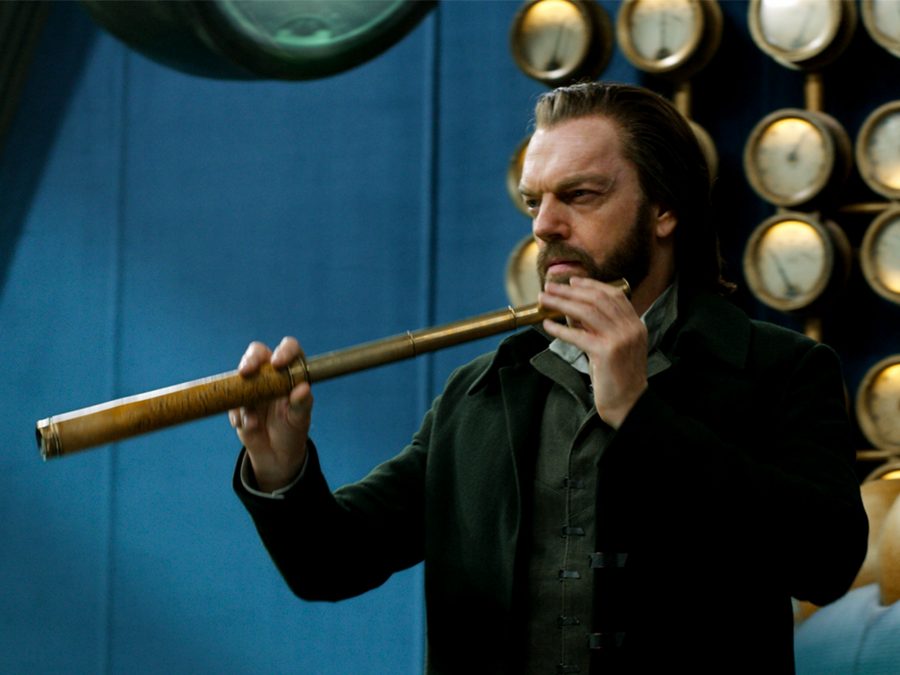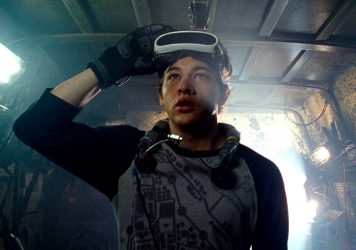Despite some spectacular production design, this is far from a precision-tooled adaptation of Philip Reeve’s steampunk fantasy.
The city of London rumbles through the badlands, hunting for prey. A smaller city breaks from cover, trying to flee, but it’s no match for our nation’s voracious capital… That’s the attention-grabbing opening of both British author Philip Reeve’s novel ‘Mortal Engines’ – first published in 2001 and followed by no less than seven sequels and prequels – and of this eye-poppingly grand, tragically confused big-screen adaptation directed by newcomer Christian Rivers and produced by his mentor and patron Peter Jackson.
In this post-post-post-dystopian hereafter, civilised society has been swept away and replaced by the principles of Municipal Darwinism, whereby densely populated, massively wheeled cities hunt each other for resources. Young historian Tom Natsworthy (Robert Sheehan) is a London patriot, proud of his home and its violent exploits, many of them planned and executed by respected adventurer Thaddeus Valentine (Hugo Weaving). But when Valentine is attacked by roving outlander Hester Shaw (newcomer Hera Hilmar), Tom finds himself left behind, marooned in the wasteland with only the taciturn Shaw for company.
It’s a far-fetched setup, admittedly, but in Rivers’ movie as in Reeve’s books, we have to take the whole city-on-wheels business somewhat on faith. Gritty realism isn’t a priority, and the result is as much berserk fairy tale as sci-fi futurism – though in keeping with Jackson’s other excursions into the realms of the fantastical, Mortal Engines is grounded in a certain emotional and cultural authenticity. This is an unforgiving future where betrayal is commonplace, the social hierarchy is strictly enforced and little old ladies get sold for sausage meat (seriously).

To give Jackson and his regular co-writers Philippa Boyens and Fran Walsh credit, they don’t seem compelled to sugarcoat: Mortal Engines the movie is every bit as idiosyncratic, tonally erratic and briefly unpleasant as Mortal Engines the book. The problem – and it’s a familiar one – is that a 293 page novel doesn’t fit into a 128 minute film however you force it, and those unwilling to make tough choices will end up with an unwieldy, overloaded swamp of exposition, confusing twists and characters who never get time to make an impression.
Which is precisely the case here. Faces come and go with precious little explanation or impact – one beloved figure from the books turns up, gets lumbered with huge amounts of backstory then is promptly knocked off. It doesn’t help that half the cast are pretty forgettable: the aristocratically cheekboned Sheehan is badly miscast as our bookish hero, never engaging the sympathies for a moment, while Hilmar is saddled with an odd transatlantic accent and a skin-deep Hollywood scar – the character was written as genuinely disfigured, but of course such things don’t sell.
Others do fare better: K-pop icon Jihae is all angular shades and bristling attitude as androgynous rebel pilot Anna Fang, while Hugo Weaving sometimes seems to be holding the entire edifice together by sheer force of Hugo Weaving-ness. But as the plot gets tangled and the characters pile up, it becomes clear that Jackson and his co-writers have simply lost control of the material: the climactic battle is murky and tedious, as heroes we’ve barely met die without fanfare and twists that would’ve been better saved for sequels are chucked randomly at the audience in a desperate attempt to engage the emotions.
Those sequels are unlikely ever to arrive. Mortal Engines aims high and sometimes lands – the designers deserve immense praise for their witty, imaginative work on the strange-but-familiar city of London, where tube trains run vertically and beefed-up Bobbies patrol brick-lined walkways – while the sheer wealth of Reeve’s imagination is still wondrous to explore. But as a film, this is simply too unwieldy, too busy, too wildly disordered to ever be more than a fascinating curio.
The title is taken from ‘Othello’ – ‘and O you mortal engines whose rude throats / Th’immortal Jove’s dread clamors counterfeit’ – but another Shakespeare quote provides a more apt description: ‘full of sound and fury…’ Well, you know the rest.
Published 6 Dec 2018
Philip Reeve’s junior novel about moving cities is a loopy steampunk marvel.
It’s easy to get swept up in Reeve’s madcap world, and the epic scale is striking.
This should’ve been so much more than spectacular effects and shouting.

By Matt Thrift
Exposition and naff CG fight for supremacy in this YA sci-fi sequel starring a seemingly unengaged Shailene Woodley.

Luc Besson’s expensive bubble gum space romp is 2017’s most spectacular misfire.

Steven Spielberg’s high-octane pop culture bonanza is hamstrung by its corny, treasure hunt plotting.